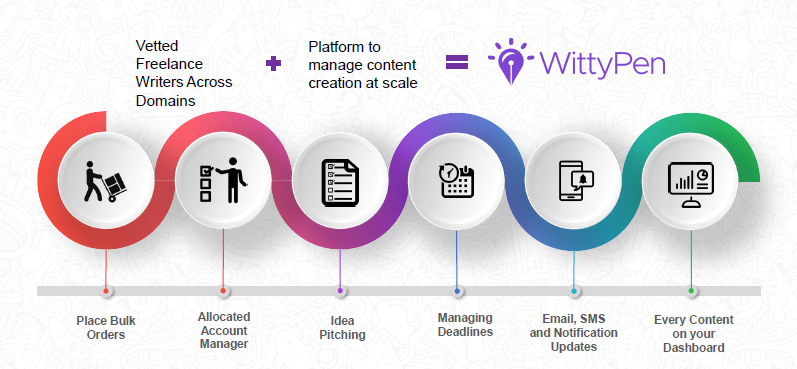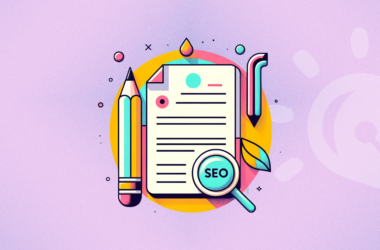Last updated on October 3rd, 2023
Having worked day and night in the content industry, I can tell you one thing for sure – Content promises to be huge as we move ahead. Today, in almost any kind of marketing, content is an essential.
I am not denying the importance of traditional marketing tools though. But let’s face it – they have to be backed with great content. A recent research from CopyPress says the same, that almost 84% of the marketing agencies believe that content is going to be the most important factor defining the success of clients’ marketing initiatives in the coming years.
I am sure you belong to that 84%, and hence, realise the importance of content and content marketing.
But What’s in It for You?
When you are leading an agency or any vertical, the most crucial aspect of your performance depends on the P&L. For content marketing to convince you and other stake holders in your agency, it should put a direct and positive impact on your P&L.
Let’s see how that happens:
1. Recurring Revenue
Content Marketing never ends. Once you start creating content to engage with your customers, it will somewhat become a routine for you to add value and get more users. Also, the effect of content marketing greatly flourishes with time, something that no business wishes to avoid.
The consistency of content marketing brings forth a recurring business to you for building an ongoing revenue stream for your content marketing agency services.
2. Opportunity to Diversify & Experiment
Blogs, Videos, Ebooks, Infographics, and more, all come under “Content”, bringing with them huge opportunities in terms of topics and themes. Since content becomes the fuel for any content marketing campaign, the opportunity to pitching multiple projects grows significantly.
This not only enables you to build better case studies, but also allows you to experiment and get the creative best out of your team.The measure of creativity and impact of your marketing campaigns will help your agency grab Awards and New Clients.
3. Impacts Your Clients Bottom Line
There isn’t a better way to retain clients than by making profits. Content marketing helps your clients get higher ROI, thereby improving their bottom line. Content marketing when done consistently adds lifetime value to your customers which improves client relationships and retention.
But how do you convince your clients of that? And, most importantly, how do you sell content marketing to your customers?
Well, why not start by telling them the benefits of it.
How Beneficial is Content Marketing for Your Customers?
Now, if you were to explain what is content marketing to your customers, how would you do it?
Content Marketing is all about driving sales in exchange for giving customers what they want while they are searching for it online.
So, the objective for the brand is to be visible on search when customers are looking for solutions in that niche. To achieve this, businesses have to get into content marketing.
Let’s look at some of the key benefits:
1. Google ? Content
The only way for Google to keep earning revenue is by helping people find what they are looking for. If you go ahead and research more about what best marketers have to say about ranking high on Google, you will find that everything boils down to content.
However, creating content is not the ultimate goal. Your brand content should be value driven and optimized for user intent rather than keywords. To be specific, 75% intent and 25% keywords; as recommended by Rand Fishkin.
2. Helps You Grow Sales ?
It is very common for Sales teams in various organisations to complain about the quality of leads shared by the Marketing department.
Let’s dig a little deeper into this. Consider you are a salon owner trying to find ways to grow your business. You come across an appointment scheduling tool, and plan to signup and explore further. Say you are still exploring, and the sales team suddenly reaches out? Will you buy? No.
A user goes through a buying journey, which includes
Awareness>Consideration>Decision
After a user is made aware of the problem along with the solution, they tend to research more about it before taking a final decision. This is where content comes in and helps your brand gain trust and credibility.
You can have a process which depends on the user’s interaction with your brand and impacts the Lead score.
Here’s the thing, if your user is aware of your offerings even before your sales team reached out to them, the chances of conversion are significantly higher.
3. Outbound is Difficult to Execute at Scale ?
Cold emailing is difficult but equally inevitable if you want to drive sales in early stages of your business. But when your customers have reached a certain scale, you can’t depend on outbound emailers to generate leads.
You need a channel that helps you get recurring leads and has a compounding effect overtime. Content Marketing does that for you.
You don’t believe me?
Inbound leads generated through content marketing have a conversion rate of 14.6%, while the ones generated through outbound campaigns have close to 1.7% conversion rate (Says HubSpot).
4. Not on the face of Customers ?
Ads are annoying. Period!
Why sell when you can educate and get better outcomes?
Adblockers are on the rise for good reasons and this makes it an opportunity for your brand to create content which is relatable and drives engagement.
Your customers are smart and they research a lot before making a decision to buy. So, if your product is more experience driven or in B2B, content is the only way to gain trust and impact on the purchasing decision.
Let’s consider it from a ROI perspective.
Say you spend $2000 a month to generate 100 leads, what happens next month? You have to spend $2000 again. Consider the scenario after 6months. Will you get any leads if you stop spending on ads?
On the contrary, take the case of Content Marketing, when you stop creating content does it mean you stop getting leads for the content that was performing well earlier?
Content Marketing has a compounding effect with ROI increasing over time provided you keep up the consistency.
Irrespective of the many benefits that a strategic content marketing plan can offer, there is still a lot of resistance from clients to try it out.
Although overcoming objections from clients might seem like a daunting task, it is definitely possible.
So what can you do about it?
What Stops Your Customers from Approaching Content?
Irrespective of the fact that content strategy can be instrumental for better business prospects, a lot of the customers are still hesitant in terms of content approach.
Among the several reasons I’ve noticed for this behaviour in the recent past, the main ones include-
a) Takes Too Much Time to Show Results
In a world of instant gratification, expecting results immediately is quite natural. However, content marketing is a slow and strategic process that requires patience for the right results.
As an agency or media consultant, you need to make the customer see the importance of giving enough time to content strategy for it to show the desired results. Similar to any sales conversion process, it is essential to consider mapping the content accurately with the customer journey and your sales process for effective results
b) Perhaps the in-house Team is Sufficient
Considering the fact that content creation & execution is a personalised process, a lot of clients prefer to keep it in-house.
The reason why you as Agencies not only survive but excel in their marketing campaigns is because of the creative talent.
Creative people prefer working for multiple brands with diversified problem scenarios and usually avoid sticking/working with a single company. You can use this credential as a means to convince your clients. The creative talent will enable them to get the required ROI and also stand out in front of the target audience.
The other set advantages come in the form of leveraging your expertise across functions such as SEO, marketing automation, creative design, etc., which can be easily de-prioritised in case it is kept in-house.
c) You probably don’t Understand my Business
This one is probably one of the most difficult ones to overcome as clients are of the opinion that an outsourced agency has no knowledge of their business whatsoever.
In such cases, you need to assert the client’s expertise and let them know that the process of content strategy is going to be a collaborative effort heeding to the client’s inputs at every stage. The client needs to be assured that they will be part of the project right from ideation till execution along with subject matter experts from the industry the client operates in.
d) You won’t be Able to Understand What We Want
A lot of clients worry about the authenticity of the content and effectiveness of the execution process with an outsourced agency. The need is to explain the process and approach to quality content and it’s strategy to the client starting with the basics. This will convince your client of your ability to bring desired & profitable results for the business.
How Can You Effectively Sell Content Marketing to Overcome These Challenges?
If you are wondering how to address these challenges, these steps can be helpful:
a) Offer the Content Marketing Expertise
Ensure that the content strategy solutions you provide as an agency are customised to individual clients’ needs. Make sure to use your expertise by building a strong content portfolio including blogs, email content, social media updates, digital press releases, newsletters, etc. in order to be able to manage the content marketing piece well for the client
b) Prioritise Reputation Management for Client Business
As a marketer representing the client, you should have the ability to bring forth better customer experience, efficiency, speed of service, creative marketing tactics for reputation management, strategic brand building, and targeted growth of the business.
Leverage your expertise in various marketing domains including targeting website traffic, SEO, etc. to deliver the desired results in terms of specific business requirements.
c) Offer the Knowledge of Integrated Marketing
Marketing today is a different ballgame altogether with a bouquet of functions. Since clients/businesses don’t have time and or expertise in the segment, you need to use your skills to bring the perfect mix of technology, design, and brand know-how to build a strong game plan for all the marketing functions including content building, market segmentation, advertising, SEO, and satisfactory customer experience.
d) Use Solid Data Analysis and Research Skills
As an agency representative, you should be able to offer strong research/analysis skills to gain a clear competitive advantage for the client’s business. You should be able to offer a detailed analysis of the current industry trends, competitors, and local markets along with the expertise of various tools and applications to effectively visualize data trends and patterns to help businesses identify the exact problems and design appropriate solutions.
How to build Content Marketing Capability in Your Agency?
If you are convinced enough about the benefits of content marketing or probably can foresee some customers adopting it in their businesses, then you should worry about the deliverables.
The leadership team in the agency will not wish to risk enough for an unexplored vertical making it difficult to role out the offering. While that definitely makes sense from a business perspective there has to be a way to execute by not risking it all.
What’s the requirement to make it possible? People.
Let’s divide them as per their roles:
- Client Servicing
- Strategy heads
- Content Creators(Writers, Designers, Video Makers etc.)
When you start a new vertical offering within an agency, it is always good to shift a few experienced people from other verticals which have now been standardized in processes. They not only perform well, but are also capable of leading these new verticals. In this case you should consider shifting people for Role 1 and Role 2. i.e.
- Client Services
- Strategy heads
Doing this saves you a lot of time in hiring and training executives on client handling, core values, and processes of the agency. But what limits the execution and scale is Role 3, Content Creators. Here’s what you should do:
1. Don’t Hire Fulltime, Hire Freelancers
Hiring fulltime employees not only takes more time but it also adds complexity and limits your scale. Modern agencies use right tools and create processes to work with people across the globe!
When you hire freelancers, you can scale your expenses up or down depending on the client work, but in other cases, you start with the payroll from Day 1.
Freelancers are creative people who don’t believe in boundaries to deliver great work. Avoiding this scenario can lead you to loosing out on huge talent potential which might have been the right fit for your audience.
But would it lead to micromanaging teams and multiple revisions? Not really. When we work with our agency partners at WittyPen, we manage teams, content creation, editing, timeline management, and everything else.
The agency only needs to talk to a single individual from our team, that’s it.

2. Determine Goals & Needs
The best way to manage projects and client expectations is to align ourselves with the goals expected from content marketing. These goals help to not only manage the project flow, but also helps freelancers understand the objectives and align the content language, tone, design, etc. with the desired goal.
When you personalize content creation along the lines of a desired goal, the expected ROI is much higher resulting in reduced overall friction in project timelines.
3. Create Briefs
Since it is you who understands the customers, creates strategy, and manages the team of freelancers, you should create a descriptive brief. When working directly with freelancers or platforms like WittyPen, the brief becomes the starting point and if all expectations are not put down on paper, it will lead to chaos.
This is the usual scenario that happens with internal teams too, where you have to diligently create briefs. Therefore, while working with freelancers you should give this special priority.
Once you are done with hiring your team of freelancers and allocating their respective responsibilities, all you need to focus on is managing the strategy level execution and scaling it with the business requirements of the customers.
To Conclude it all
Surviving in a fiercely competitive online marketing segment with aspirations of acquiring a solid client base and retaining it successfully is quite an uphill struggle for marketing agencies. The need is to approach the process of content selling strategically, both in terms of conceptualization and execution.
If approached in a systematic way, it can be instrumental in ensuring a constant flow of revenue and robust customer base for both your agency and the client’s business.
If you make sure to understand the client’s expectations thoroughly followed by co-creating a strategic content marketing plan along with them, both success and a positive ROI will follow.









